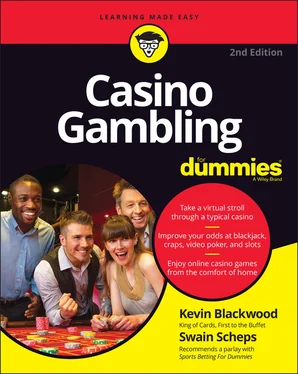Using markers against casino credit
After you establish your line of credit, don’t expect to get a plastic credit card with the casino logo on the front. Instead, you use markers at the tables to tap into your line of credit. (A marker is basically a check or IOU that you sign at the gaming table.)
Don’t like the cut your bank takes when you use the ATM at home? Try using one at a casino! Not only are the odds at a casino stacked against you, but so are the ATM fees. In addition to the standard bank charges for using the ATM, the casino hits you with a stiff fee at the terminal. How can you avoid both fees? Simple: Bring a set amount of cash and spend only what you bring.
 Keep this fact in mind as you sign a marker for that next baccarat game: Chips — and now markers — serve as tools to distance you psychologically from the reality that you’re spending your hard-earned money. And when you don’t have to reach into your wallet when you’re losing, continuing to play is a whole lot easier. If you aren’t going to stick to cash while gambling, then be sure you’re constantly aware of where you stand with the house and never lose sight of the fact that payback will occur before the end of your casino stay.
Keep this fact in mind as you sign a marker for that next baccarat game: Chips — and now markers — serve as tools to distance you psychologically from the reality that you’re spending your hard-earned money. And when you don’t have to reach into your wallet when you’re losing, continuing to play is a whole lot easier. If you aren’t going to stick to cash while gambling, then be sure you’re constantly aware of where you stand with the house and never lose sight of the fact that payback will occur before the end of your casino stay.
At the end of your visit, the casino expects you to write a check to cover the cost of any losses you incurred during your visit. If you refuse to pay, the casino has the right to post the outstanding markers with your bank for collection from your account.
 You use markers only after you’ve established a line of credit with the casino. And a line of credit is good only at the casino where you applied. In other words, you can’t borrow money at the club across the street unless the same company owns both casinos.
You use markers only after you’ve established a line of credit with the casino. And a line of credit is good only at the casino where you applied. In other words, you can’t borrow money at the club across the street unless the same company owns both casinos.
Knowing When Enough Is Enough
By its very definition, gambling implies risk, something many people aren’t used to dealing with. In your work life, you eliminate uncertainty by accepting a job with a fixed salary. In your daily life, you protect against disaster through a spectrum of safety precautions, from smoke detectors to seat belts.
When you walk into the casino, the house is betting that your unfamiliarity with risk will work in its favor. (Look at how easy establishing a line of credit is and how quickly the little extras, such as comps, make you amenable to spending and risking more money.)
By following the advice in this chapter, you’re taking the appropriate steps to reduce your risk of gambling-related problems when you enter the casino. But you’re wise to continue looking for signs of trouble during, or even before, your casino visit. These problems can take many forms beyond simple financial issues; they can affect your relationships as well as your health. This section helps you identify the warning signs so you can walk away before it’s too late.
Knowing the odds of failure
 The best protection you can offer yourself in a casino is knowledge. Having a full understanding of the odds involved with every game allows you to set realistic limits in your play. You can know when pushing a little harder and continuing to play is okay, but you can also have a solid grasp on when it’s time to tuck your tail between your legs and go home. Without a basic understanding of your chances, you won’t be able to recognize when you’ve taken one step too far.
The best protection you can offer yourself in a casino is knowledge. Having a full understanding of the odds involved with every game allows you to set realistic limits in your play. You can know when pushing a little harder and continuing to play is okay, but you can also have a solid grasp on when it’s time to tuck your tail between your legs and go home. Without a basic understanding of your chances, you won’t be able to recognize when you’ve taken one step too far.
Because heaven knows the casino does everything in its power to help you step off the plank and into the ocean of risk, is it any wonder some people get in over their heads before they even realize they’re in deep water? Chapter 3looks more closely at odds, and each chapter on the specific games examines the odds and explains whether the game is worth playing or not.
You may have packed light for your long-weekend gambling getaway. But, trust me, you’re carrying more baggage than you realize — all that other stuff that defines who you are and how you react to certain situations. So, be realistic about your own personality and temperament.
 If you have the tendency to get a little out of control when things go wrong, then bring along some safeguards in the event you start to lose. Have a friend hold your wallet, or simply leave access to money (beyond your bankroll) behind and carry nothing but cash. Above all else, be honest about how you’ve gambled in the past. Just because you haven’t been a perfect angel doesn’t mean you can’t go, but you do have to be more careful than other gamblers.
If you have the tendency to get a little out of control when things go wrong, then bring along some safeguards in the event you start to lose. Have a friend hold your wallet, or simply leave access to money (beyond your bankroll) behind and carry nothing but cash. Above all else, be honest about how you’ve gambled in the past. Just because you haven’t been a perfect angel doesn’t mean you can’t go, but you do have to be more careful than other gamblers.
Are you a disciplined type? Is adopting positive behaviors, such as daily exercise and saving money, easy for you? If you’re cool, calm, and rational in your daily life, you’re likely to be a good candidate for video poker or the blackjack tables. Or are you impulsive and undisciplined? Does a trip to the mall for a package of batteries turn into a shopping spree that sets you back a couple of paychecks? Do you struggle to stick to a diet? If you lack control in everyday activities, such as shopping and eating, then casinos can become a dangerous diversion. I’m not suggesting that you swear off casino visits if you can’t stop yourself from eating just one more chocolate chip cookie. But understanding your nature and taking precautions to protect yourself from “cleaning out the cookie jar” is important.
 If you choose to partake in the pleasures and excitement of a casino visit, then, in addition to strictly following the money-management advice in this chapter, you may want to take extra steps to curtail your impulsive side. For example, try traveling with someone who’s more disciplined than you are and who is willing to serve as the designated banker.
If you choose to partake in the pleasures and excitement of a casino visit, then, in addition to strictly following the money-management advice in this chapter, you may want to take extra steps to curtail your impulsive side. For example, try traveling with someone who’s more disciplined than you are and who is willing to serve as the designated banker.
Resisting the urge to chase losses
Even if you’re a highly disciplined soul, the hypnotic sway of the casino can seduce you into uncharacteristic behavior. One typical lure that pulls gamblers off the cliff of control is chasing your losses. For example, say you’ve lost more than you intended. But, you think, if you could just win one big bet, your problem would be erased. So, chasing your losses is tempting, especially in a casino where people seem to be winning all around you.
The reality is that most people walk out of casinos with less money than they started. Living to fight another day is far superior to outstaying your welcome and chasing your losses with bigger and bigger bets. It’s a natural instinct, and it’s a phenomenon that seems to sweep over casinos from the Mississippi River to Monte Carlo.
 Don’t fall victim to chasing your losses! When you seek to retrieve that lost money, you start throwing good money after bad, hoping to win it all back. To avoid losing even more of your gambling bankroll, treat a loss as just that: a loss. Say no to the next hand or play, and say yes to some other activity.
Don’t fall victim to chasing your losses! When you seek to retrieve that lost money, you start throwing good money after bad, hoping to win it all back. To avoid losing even more of your gambling bankroll, treat a loss as just that: a loss. Say no to the next hand or play, and say yes to some other activity.
Читать дальше

 Keep this fact in mind as you sign a marker for that next baccarat game: Chips — and now markers — serve as tools to distance you psychologically from the reality that you’re spending your hard-earned money. And when you don’t have to reach into your wallet when you’re losing, continuing to play is a whole lot easier. If you aren’t going to stick to cash while gambling, then be sure you’re constantly aware of where you stand with the house and never lose sight of the fact that payback will occur before the end of your casino stay.
Keep this fact in mind as you sign a marker for that next baccarat game: Chips — and now markers — serve as tools to distance you psychologically from the reality that you’re spending your hard-earned money. And when you don’t have to reach into your wallet when you’re losing, continuing to play is a whole lot easier. If you aren’t going to stick to cash while gambling, then be sure you’re constantly aware of where you stand with the house and never lose sight of the fact that payback will occur before the end of your casino stay. If you have the tendency to get a little out of control when things go wrong, then bring along some safeguards in the event you start to lose. Have a friend hold your wallet, or simply leave access to money (beyond your bankroll) behind and carry nothing but cash. Above all else, be honest about how you’ve gambled in the past. Just because you haven’t been a perfect angel doesn’t mean you can’t go, but you do have to be more careful than other gamblers.
If you have the tendency to get a little out of control when things go wrong, then bring along some safeguards in the event you start to lose. Have a friend hold your wallet, or simply leave access to money (beyond your bankroll) behind and carry nothing but cash. Above all else, be honest about how you’ve gambled in the past. Just because you haven’t been a perfect angel doesn’t mean you can’t go, but you do have to be more careful than other gamblers.










